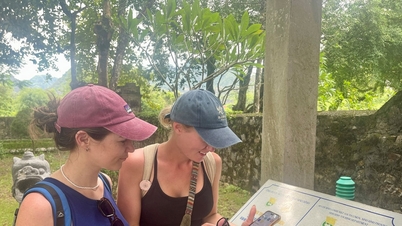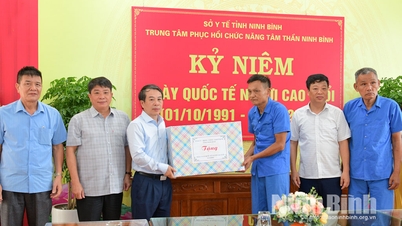As African swine fever continues to break out and spread in localities in the province, many farming households are facing difficulties, and epidemic prevention and control work is on alert. Disease prevention and control measures have been and are being implemented synchronously to limit damage to current livestock farmers.
Yen Mo is one of the localities with a high number of pigs infected with African swine fever. Since the beginning of the year, African swine fever has re-emerged in the district twice, the first from March 30, 2023 to July 29, 2023, the second from October 13; accumulated to November 21, 2023, the whole district had to destroy 655 pigs of 134 households in 13 communes and towns with a weight of 30,089 kg due to African swine fever.
Faced with the complicated developments of the epidemic, the District People's Committee has issued a decision to declare the epidemic in communes and towns, proactively arranged funds to purchase chemicals and lime powder to disinfect livestock areas, gathering points, trading and slaughtering points, and destruction pits to prevent and control African swine fever and deploy measures to handle outbreaks.
Organize zoning, epidemic suppression, apply synchronous and drastic epidemic prevention and control measures, quickly control the epidemic to prevent it from spreading widely. At the same time, organize the destruction of sick and dead pigs due to the disease according to regulations, not to spread and infect the community. In addition, the district established a mobile inspection team for African swine fever prevention and control in communes and towns to inspect and control the activities of buying, selling, slaughtering, transporting livestock, poultry and livestock and poultry products in the management area, organize 24/24h inspection, especially at markets, gathering points, buying, selling, and slaughtering pigs.
Since May 2022, Vietnam has had two types of African swine fever vaccines (NAVET-ASFVAC researched and produced by NAVETCO Central Veterinary Medicine Joint Stock Company and AVAC ASF LIVE researched and produced by AVAC Vietnam Joint Stock Company) registered and granted a Certificate of Circulation in accordance with the provisions of the Law on Veterinary Medicine, documents guiding the implementation of the Law and international technical standards for veterinary vaccines. These are the first commercial African swine fever vaccines licensed for circulation. The Ministry of Agriculture and Rural Development said that currently, more than 40 provinces and cities nationwide have been vaccinated against African swine fever. Vaccinated pigs are all healthy and growing normally, the rate of vaccinated pigs with high antibody immune response, reaching an average of over 95%.
Ms. Nguyen Thi Len, Head of the Department of Agriculture and Rural Development of Yen Mo district, said: In the face of the re-emergence of African swine fever, recently, the Department of Agriculture and Rural Development of the district has stepped up propaganda work to livestock households to regularly organize cleaning and general cleaning of livestock areas and public areas, seriously implementing disinfection and sterilization with chemicals and lime powder continuously once a day in the first week and 3 times a week in the next 2-3 weeks, minimizing the entry of strangers into the livestock areas.
At the same time, coordinate with the Department of Animal Husbandry and Veterinary Medicine (Department of Agriculture and Rural Development) to strengthen inspection, supervision, detection, prevention and strict handling of cases of illegal animal trading and transportation, animal slaughter, and processing of products that do not meet requirements on disease prevention and control, food safety, to prevent the spread of diseases and ensure food supply at the end of the year.
According to information from the Provincial Department of Animal Husbandry and Veterinary Medicine: From March to now, the whole province has 69 communes with 310 villages, of which 1,500 households have pigs infected with African swine fever, nearly 8,000 sick pigs had to be destroyed, with a total weight of over 3,500 tons.
The units with a large number of cases are Nho Quan, Gia Vien and Yen Mo districts, many communes are in a state of red alert for African swine fever. The reason for the sharp increase in some African swine fever outbreaks in recent times is due to outbreaks occurring in small-scale livestock farms and households that have not ensured biosafety farming conditions. Meanwhile, the pathogens remain in the livestock environment, disinfection and sterilization work has not been done regularly, infected livestock have not been vaccinated against the disease... In particular, there is a phenomenon that some livestock households, due to lack of knowledge about African swine fever, when pigs get sick, do not report to local authorities and veterinary agencies but sell sick pigs to traders to sell. This is one of the reasons why the epidemic breaks out and spreads widely.
To prevent the spread of the epidemic, the Provincial People's Committee has directed specialized agencies to strengthen measures to prevent and control the epidemic, destroy infected pigs, isolate and disinfect livestock areas, especially epidemic areas.
Strengthen information and propaganda work in many forms so that cadres, party members, organizations, breeders and the community can grasp and understand the level of danger, prevention and control measures and sanctions for households and localities that do not seriously implement disease prevention and control regulations.
In addition, tighten quarantine and re-inspection of animals and animal products, proactively coordinate to deploy inspection and control measures to detect, handle, and recommend strict handling of cases of illegal buying, selling, and transporting of animals and animal products from outside into the area or through the area.
Strictly control the slaughtering and trading of pork and pork products at small-scale slaughterhouses, markets, food collection and trading points; organize surprise inspections of compliance with commitments on slaughtering, preliminary processing and processing; promptly detect and strictly handle cases of transporting, slaughtering and trading of pigs and pig products with or suspected of having diseases that cause outbreaks and spread of epidemics; ensure food supply to serve the market at the end of the year.
Article and photos: Tien Dat
Source



![[Photo] National Assembly Chairman Tran Thanh Man chairs the 8th Conference of full-time National Assembly deputies](https://vphoto.vietnam.vn/thumb/1200x675/vietnam/resource/IMAGE/2025/9/29/2c21459bc38d44ffaacd679ab9a0477c)
![[Photo] General Secretary To Lam receives US Ambassador to Vietnam Marc Knapper](https://vphoto.vietnam.vn/thumb/1200x675/vietnam/resource/IMAGE/2025/9/29/c8fd0761aa184da7814aee57d87c49b3)

![[Photo] Many streets in Hanoi were flooded due to the effects of storm Bualoi](https://vphoto.vietnam.vn/thumb/1200x675/vietnam/resource/IMAGE/2025/9/29/18b658aa0fa2495c927ade4bbe0096df)
![[Photo] General Secretary To Lam attends the ceremony to celebrate the 80th anniversary of the post and telecommunications sector and the 66th anniversary of the science and technology sector.](https://vphoto.vietnam.vn/thumb/1200x675/vietnam/resource/IMAGE/2025/9/29/8e86b39b8fe44121a2b14a031f4cef46)































































































Comment (0)